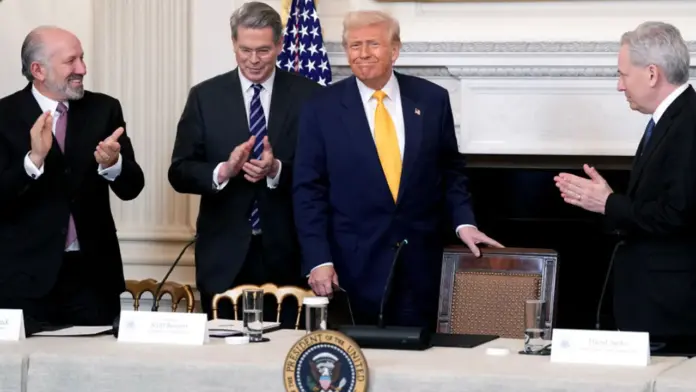Under the Capitol Dome, a Crypto Turn with Authoritarian Flavors
In what amounts to a silent revolution in the corridors of Washington, the US House of Representatives passed on July 17th a set of landmark laws regulating cryptocurrencies. Spearheaded by the Trump administration and supported by a disciplined Republican majority, these three bills, most notably the Clarity Act, signal a fundamental reorientation of American monetary and technological policy. This is not regulation as mere oversight; it is regulation as a political weapon.
The Clarity Act: Regulation or Deregulation in Disguise?
Thursday’s session saw the House greenlight the Clarity Act, a long-anticipated legal framework for digital assets, ostensibly designed to bring “clarity and innovation” to the crypto sector. The language is polished, bureaucratic, and misleading.
What we are witnessing is not regulation in the traditional sense, but a strategic unshackling of crypto interests long mired in legal ambiguity. Fraud, manipulation, and market opacity are not addressed, they are legitimized. Critics from the Democrat camp claim the bill offers investors little protection, and their skepticism is well-founded.
Trump’s Strategic Pivot: From Crypto Critic to Kingmaker
Once a vocal opponent of cryptocurrencies, he called them “a scam” in 2019, Trump has performed a radical U-turn. Today, he is crypto’s most powerful ally. Within months of returning to the White House, he has:
- halted federal prosecutions against major crypto firms,
- appointed a crypto-sympathetic figure to lead the SEC,
- established a strategic reserve using 200,000 government-seized bitcoins,
- and is reportedly preparing an executive order to allow retirement funds (401(k)s) to invest in digital currencies, potentially unlocking $8.7 trillion in new capital.
The political calculation is transparent: consolidate economic momentum before the 2026 midterms, and tie the crypto boom to the Trump brand.
The Genius Act and the Rise of the Dollar-Backed Stablecoin
Next came the Genius Act, focusing on stablecoins, cryptocurrencies pegged to traditional fiat currencies like the US dollar. The legislation requires issuers to hold equivalent liquid reserves such as Treasury bonds or cash deposits.
On paper, this is a protective measure. In practice, it is a Trojan horse: a way for American tech giants and banks to deploy crypto instruments under the guise of national interest. Amazon, Walmart, Meta, Uber, and Airbnb are all rumored to be developing their own stablecoins.
The logic is unmistakable: by flooding the global economy with dollar-backed stablecoins, Washington reinforces its monetary hegemony, without ever having to issue a central bank digital currency (CBDC).
A Crypto Ban for the State: Freedom or Strategic Captivity?
The third and final bill, passed later that same day, enshrines in law Trump’s January executive order prohibiting the federal government from creating its own cryptocurrency.
This move has been praised by libertarians and market players, but its implications are profound. In banning a public CBDC, Trump ensures that only private entities, not the state, control the architecture of digital money.
This is not about freedom. It is about control, by the private sector, for the private sector. Conveniently, Trump-linked startup World Liberty Financial recently launched its own stablecoin, the USD1. The conflict of interest is barely disguised.
Conflict of Interest? Enrichment Behind the Curtain
Democratic Representative Maxine Waters didn’t mince words: “These crypto laws don’t protect consumers, they greenlight Trump’s scams and set the stage for the next financial crisis.” Transparency watchdogs are sounding the alarm too, noting that Trump’s personal fortune has more than doubled since aligning with crypto ventures.
In less than a year, he has publicly partnered with multiple crypto firms. This isn’t just policy, it’s profit. And it’s personal.
Crypto Trumpism Becomes Law
What the US Congress has done is not mere regulation. It is a codification of Trumpian techno-financial ideology: chaotic capitalism, state-enabled profiteering, and a dangerous intertwining of public power with private gain.
These laws do not just reshape the crypto sector, they reshape the relationship between state, market, and individual liberty. The line between public interest and private ambition has never been thinner.



